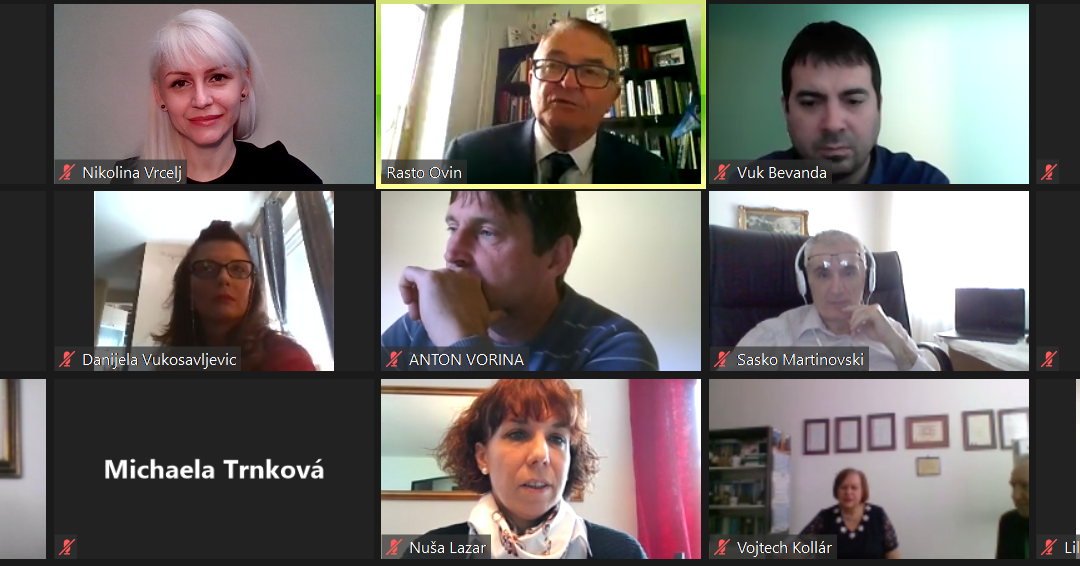Enterprise’s Trust in Stakeholders: For a New Culture of Sustainability. Investigation on Companies Listed on the Italian Stock Exchange
Katia Giusepponi – University of Macerata, Department of Education, Cultural Heritage and Tourism, P.le Bertelli, c.da Vallebona, 62100 Macerata, Italy
7th International Scientific ERAZ Conference – ERAZ 2021 – Conference Proceedings: KNOWLEDGE BASED SUSTAINABLE DEVELOPMENT, Online/virtual, May 27, 2021
ERAZ Conference Proceedings published by: Association of Economists and Managers of the Balkans – Belgrade, Serbia
ERAZ conference partners: Faculty of Economics and Business, Mediterranean University, Montenegro; University of National and World Economy – Sofia, Bulgaria; Faculty of Commercial and Business Studies – Celje, Slovenia; AMBIS University, Prague – Czech Republic; Faculty of Applied Management, Economics and Finance – Belgrade, Serbia
ERAZ Conference 2021 Conference Proceedings: ISBN 978-86-80194-46-2, ISSN 2683-5568, DOI: https://doi.org/10.31410/ERAZ.2021
Keywords:
Collaborative enterprise;
ESG value;
Engagement methods
Abstract: The premise of this study is that the essence and concreteness of stakeholder engagement, within sustainability practices, derive from the trust attributed by the company to the value of stakeholder contribution in terms of ideas, points of view and evaluation. The significance of stakeholder engagement processes and results expressed by the company is therefore a signal of this trust, indicator which can be identified and appraised by studying the corporate sustainability reporting systems. The work highlights the findings of an investigation carried out in this field, with the focus on the sustainability reports of large Italian listed companies. Alongside relevant positive examples, some areas of resistance to fully inclusive approaches emerge. Elements of reflection arise from this, in the perspective of the evolution of the corporate culture in terms of integrated sustainability, and quality of business decisions.

ERAZ Conference
Creative Commons Non Commercial CC BY-NC: This article is distributed under the terms of the Creative Commons Attribution-Non-Commercial 4.0 License (https://creativecommons.org/licenses/by-nc/4.0/) which permits non-commercial use, reproduction and distribution of the work without further permission.

References
AccountAbility (2015). AA1000, AccountAbility Stakeholder Engagement Standard (2015). At <https://www.accountability.org/standards/aa1000-stakeholder-engagement-standard> Accessed on 2021 May 1.
Amplifon (2020). Sustainability report 2020. At <https://corporate.amplifon.com/en/sustainability/sustainability-reporting/dnf-2020> Accessed on 2021 May 1.
Andriof, J., Waddock, S., Husted, B., & Rahman, S. S. (2017). Unfolding stakeholder thinking: Theory, responsibility and engagement. New York: Routledge.
Bandsuch, M. R., Pate, L. E., & Thies, J. (2008). Rebuilding stakeholder trust in business: An examination of principle-centered leadership and organizational transparency in corporate governance. Business and Society Review, 113(1), 99-127.
Barringer, B. R., & Harrison, J. S. (2000). Walking a tightrope: Creating value through interorganizational relationships. Journal of management, 26(3), 367-403.
Borsa Italiana (2018). FTSE Russell – FTSE MIB Index. At <https://www.borsaitaliana.it/azioni/ tutti-gli-indici/metodologiadicalcolo/ftse.en_pdf.htm> Accessed on 2021 May 1.
Borsa Italiana (2021), FTSE MIB Index. Constituents. At <https://www.borsaitaliana.it/borsa/ azioni/ftse-mib/lista.html?lang=en> Accessed on 2021 May 1.
Bosse, D. A., Phillips, R. A., & Harrison, J. S. (2009). Stakeholders, reciprocity, and firm performance. Strategic Management Journal, 30(4), 447-456.
Brown, T. (2008). Design thinking. Harvard Business Review, 86(6), 84-92.
DiPiazza Jr, S. A., & Eccles, R. G. (2002). Building public trust: The future of corporate reporting. New York: John Wiley & Sons.
European Commission – EC (2011), Communication from the Commission to the European Parliament, the Council, the European Economic and Social Committee of the Regions – A renewed EU strategy 2011-14 for Corporate Social Responsibility. COM(2011) 681 final. At <https://eur-lex.europa.eu/legal-content/EN/TXT/?uri=CELEX:52011DC0681> Accessed on 2021 May 1.
Fassin, Y. (2012). Stakeholder management, reciprocity and stakeholder responsibility. Journal of Business Ethics, 109(1), 83-96.
Freeman, R. E., & Reed, D. L. (1983). Stockholders and stakeholders: A new perspective on corporate governance. California Management Review, 25(3), 88-106.
Freeman, R. E., Harrison, J. S., Wicks, A. C., Parmar, B.L., & De Colle, S. (2010). Stakeholder theory: The state of the art. Cambridge, UK: Cambridge University Press.
Global Reporting Initiative (2016). Universal Standards – GRI 101 Foundation 2016; GRI 102 General disclosures 2016; GRI 103 Management approach 2016. At <https://www. globalreporting.org/> Accessed on 2021 May 1.
Greenwood M. (2007). Stakeholder Engagement: Beyond the Myth of Corporate Responsibility. Journal of Business Ethics, 74, 315-327.
Halal, W. E. (2001). The collaborative enterprise: A stakeholder model uniting profitability and responsibility. Journal of corporate citizenship, (2), 27-42.
Kolko, J. (2015). Design Thinking Comes of Age, Harvard Business Review, 93(9), 66-71.
Manetti, G. (2011). The quality of stakeholder engagement in sustainability reporting: empirical evidence and critical points. Corporate social responsibility and environmental management, 18(2), 110-122.
Martin, R., & Martin, R. L. (2009). The design of business: Why design thinking is the next competitive advantage. Harvard Business Press.
Post, J. E., Preston, L. E., & Sachs, S. (2002). Managing the extended enterprise: The new stakeholder view. California management review, 45(1), 6-28.
Poste Italiane (2019). Annual report 2019. At <https://www.posteitaliane.it/files/1476515475256/ Annual-Report-2019.pdf> Accessed on 2021 May 1.
Prahalad, C. K., & Ramaswamy, V. (2003). The New Frontier of Experience Innovation. MIT Sloan Management Review, 44(4), 12-18.
Ramaswamy, V., & Ozcan, K. (2020). The co-creation paradigm. Redwood City: Stanford University Press.
Rowley, T. J. (1997). Moving beyond dyadic ties: A network theory of stakeholder influences. Academy of management Review, 22(4), 887-910.
Tencati, A., & Zsolnai, L. (2009). The collaborative enterprise. Journal of Business Ethics, 85(3), 367-376.
United Nations – UN (1987). Report of the World Commission on Environment and Development – Our Common Future. At <https://sustainabledevelopment.un.org/content/documents/5987our-common-future.pdf> Accessed on 2021 May 1.
Wayne Gould, R. (2012). Open innovation and stakeholder engagement. Journal of technology management & innovation, 7(3), 1-11.

